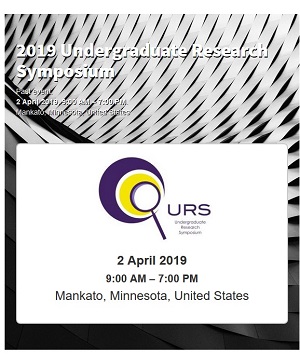Synthesis Gas Engine Efficiency Optimization
Location
CSU Ballroom
Start Date
2-4-2019 10:00 AM
End Date
2-4-2019 11:30 AM
Student's Major
Integrated Engineering
Student's College
Science, Engineering and Technology
Mentor's Name
Jacob Swanson
Mentor's Department
Integrated Engineering
Mentor's College
Science, Engineering and Technology
Description
Climate change is a global concern in which the impact been widely discussed. A major concern of this issue is the quantity of greenhouse gases entering the atmosphere. One path to rectifying this is a renewable energy formed from biomass gasification as a carbon neutral energy alternative. Biomass gasification creates a producer gas called synthesis gas, which can be burned as fuel. Synthesis gas burning spark ignition engines have not yet been optimized for efficiency and therefore are not currently practical for consumer use. Literature reviews on recent research were conducted to find engine modifications which resulted in operational efficiency gains. This research suggested that an increase in engine compression ratio, along with advancing ignition timing to roughly 30 degrees before top dead center were optimal modifications for improving efficiency. Experiments varying compression ratio and ignition timing will be performed to validate this research. A test stand was created to take measurements of various characteristics of a synthesis gas fueled engine. From those measurements, the efficiency can be calculated. The compression ratio for the chosen engine is easily modifiable. Multiple engines will be purchased in order to test several different compression ratios. An electronic ignition system was previously added to the test stand that creates the capability of controlling the ignition timing for the purpose of testing its effect on efficiency. Experiments varying compression ratio and ignition timing will validate this research and help advance the knowledge in how to leverage carbon neutral energy production towards reducing harmful greenhouse gasses.
Synthesis Gas Engine Efficiency Optimization
CSU Ballroom
Climate change is a global concern in which the impact been widely discussed. A major concern of this issue is the quantity of greenhouse gases entering the atmosphere. One path to rectifying this is a renewable energy formed from biomass gasification as a carbon neutral energy alternative. Biomass gasification creates a producer gas called synthesis gas, which can be burned as fuel. Synthesis gas burning spark ignition engines have not yet been optimized for efficiency and therefore are not currently practical for consumer use. Literature reviews on recent research were conducted to find engine modifications which resulted in operational efficiency gains. This research suggested that an increase in engine compression ratio, along with advancing ignition timing to roughly 30 degrees before top dead center were optimal modifications for improving efficiency. Experiments varying compression ratio and ignition timing will be performed to validate this research. A test stand was created to take measurements of various characteristics of a synthesis gas fueled engine. From those measurements, the efficiency can be calculated. The compression ratio for the chosen engine is easily modifiable. Multiple engines will be purchased in order to test several different compression ratios. An electronic ignition system was previously added to the test stand that creates the capability of controlling the ignition timing for the purpose of testing its effect on efficiency. Experiments varying compression ratio and ignition timing will validate this research and help advance the knowledge in how to leverage carbon neutral energy production towards reducing harmful greenhouse gasses.
Recommended Citation
Wlizlo, Frederick; Ryan Hammerquist; Erick Estrada; and Daniel Stroberger. "Synthesis Gas Engine Efficiency Optimization." Undergraduate Research Symposium, Mankato, MN, April 2, 2019.
https://cornerstone.lib.mnsu.edu/urs/2019/poster-session-A/38




